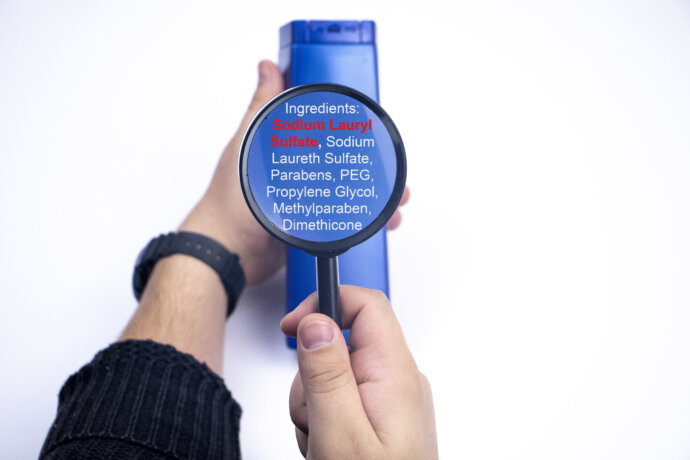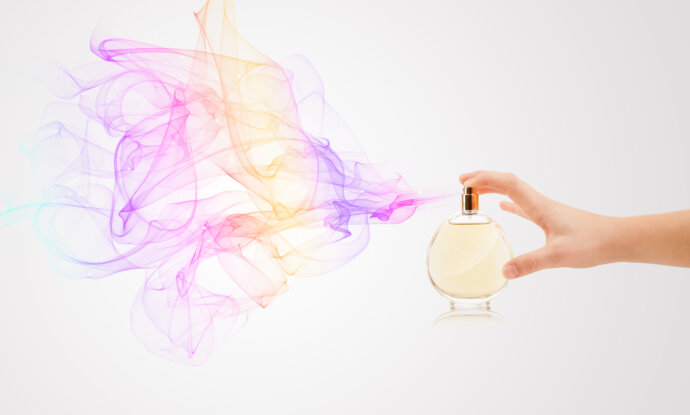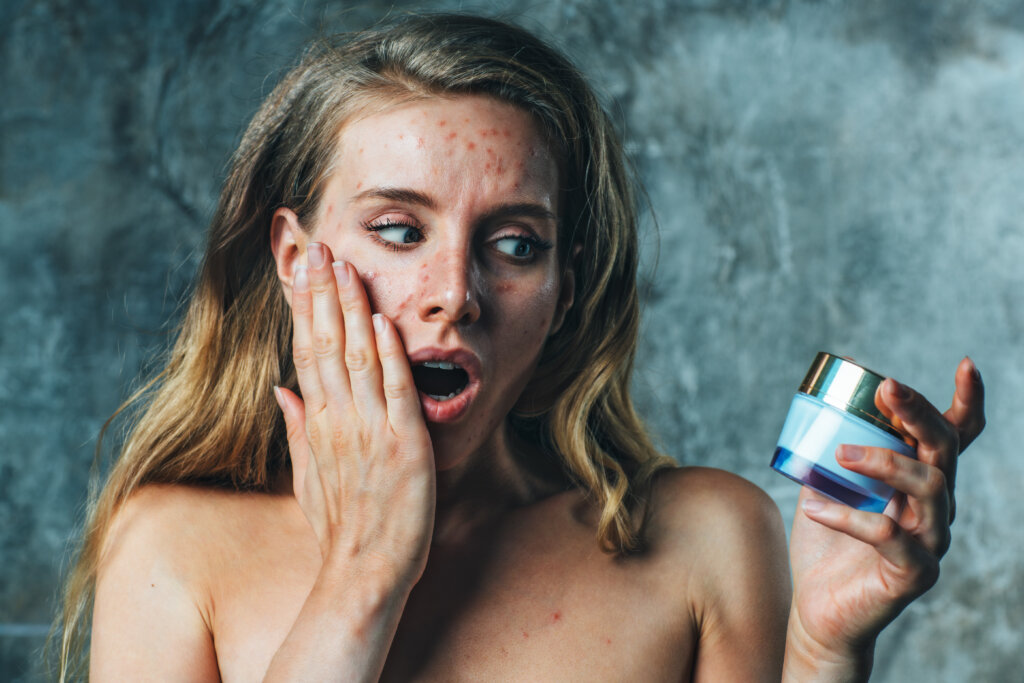Your life will most probably include using everyday products like Shampoo and moisturisers, hand, and body washes, washing up products etc. and it is important for you, as a psoriasis or eczema sufferer to check ingredient labels carefully. This can even include your toothpaste which will most likely contain Sodium Lauryl Sulphate (SLS)! Learning about which ingredients to avoid because they could irritate and inflame your skin or which ingredients will help to relieve itching or loosen plaques can take some trial and error but it’s worth looking into. The reason behind this is that research has proven that over 60% of what is applied to the skin may be absorbed into your bloodstream and knowing the side effects of certain chemicals could be one of the most important ways that you can help keep flare ups at bay.
We have listed 6 ingredients worth looking out for and avoiding!
SULPHATES

Sulphates are foaming and emulsifying agents and Sodium Lauryl Sulphate (SLS) is the most common one. It is generally found in shampoos, shower gels, toothpaste, and even gentle baby washes. However, SLS should most definitely be avoided if you suffer from psoriasis, eczema, or dry flaky skin as it is a known skin irritant that can damage the skin’s barrier function and reduce the skin’s ability to keep out allergens.
The problem is that Sulphates are a bit too good at stripping natural oils away from your scalp and skin which, at best, will leave your skin feeling parched and, at worst, will cause severe irritation, redness, itchiness and possibly even cause a full allergic reaction.
The ability of Sulphates to damage the skin’s barrier is so well documented that some research studies are using it to create the damage and then testing new moisturisers coming on to the market to see if they can repair that damage!!!!
There are some gentler alternatives to Sodium Lauryl Sulphate that are less likely to cause irritation. These are Sodium Laureth Sulphate or Sodium Lauryl Ether Sulphate (SLES). However, there are many products on the market for cleansing and moisturising that don’t contain any sulphates and we would suggest that avoiding this chemical completely is best. Our M-Folia products do not contain any sulphates – we phased that out of our formulas more than 5 years ago.
PARABENS
Preservative ingredients are necessary in cosmetics, food and personal hygiene products to prevent the growth of fungi and bacteria which cause products to spoil. Using products with certain parabens in them can, over time, cause a build-up which does more harm than good as they are rapidly absorbed through unbroken skin and into the body
Many skincare and beauty manufacturers have been spurred into using new and more natural preservation methods which are just as effective at maintaining freshness and quality. This change has come about in response to the overwhelming concern about parabens from consumers. The pressure of so many customers avoiding products with any parabens present has resulted in a large reduction of products being manufactured with artificial parabens.
The main parabens and preservatives to avoid are:
methylparaben, ethylparaben, propylparaben, butylparaben and isobutylparaben
These artificial preservatives are one of the main causes of irritation and allergic reactions in the skin, particularly in sensitive or damaged skin. Most topical hydrocortisone creams and antibiotic ointments are manufactured without using parabens as studies have shown that parabens are particularly inflammatory to people with psoriasis, eczema or contact dermatitis. Some products can often contain more than one paraben and there is research to show that these parabens may be linked to hormone disruption by mimicking oestrogen and subsequently contributing to the development of cancer.
Methylchloroisothiazolinone (MCI) and Methylisothiazolinone (MI)
These ingredients are chemical preservatives used in skin care products and household cleaners. They are often used in baby products and make up and, like the parabens above, are used to eliminate the fungi and bacteria which cause the breakdown of the product. However, they are not good for the health of your skin. These chemicals can cause itching and flaking and severe irritation. The rise in rates of allergic contact dermatitis led to a review of the safety of MI in 2013 by an independent advisory body, The Scientific Committee on Consumer Safety, which concluded that there is no safe level of MI for leave-on products. It is still quite widely used in cleaning products and cosmetics and should most definitely be avoided.
2-bromo-2 nitropropane-1,3-diol (Also known as Bronopol)
This chemical is a preservative and antiseptic frequently used in cosmetics and shampoos. It is also used in medicated skin creams which is pretty nasty as it has not only been proven to be a skin irritant but is also very toxic for the environment.
PROPYLENE GLYCOL
Propylene glycol is an ingredient that is added to cosmetics to increase moisture retention in skin and hair. However, it has been associated with allergic contact dermatitis even in concentrations as low as 2%. Research has shown that some people may experience an allergic reaction to propylene glycol including mild skin irritation and redness. It was, in fact, voted Allergen of the Year in 2018 by the American Contact Dermatitis Society. It has been shown to cause a red, itchy rash where it is applied and people with eczema and psoriasis are likely to be very sensitive to this ingredient.
ARTIFICIAL PERFUMES

Fragrances which are added to products may smell good, but they are one of the leading causes of allergy and skin irritation. 95% of most perfumes are made with synthetic chemicals and although there are many scents that are created with natural ingredients, they can also cause skin irritation and nasty reactions if you suffer from sensitive skin. It is essential, as psoriasis sufferers, to ensure that the skin barrier is kept intact and doesn’t suffer irritation which will lead to inflammation. Fragrances have been proven to act as a skin irritant and should be avoided if possible. Be aware that a product that says ‘unscented’ can still contain fragrance. It needs to say ‘Fragrance Free’ to be certain.
It may also be wise to avoid spraying perfumes directly on to the skin.
ALCOHOL
Alcohol is a popular ingredient in moisturisers and if you suffer from psoriasis or eczema, you should avoid ingredients such as Isopropyl Alcohol, Denatured Alcohol (Denat), and Ethanol as they can be drying and irritating. Alcohol breaks down the skin’s barrier to allow certain ingredients to penetrate the skin more effectively but, in time this may eventually destroy the substances that keep your skin healthy.
These are not to be confused with fatty alcohols or wax alcohols such as Cetyl or Cetearyl Alcohol which are non-drying and tend to be 100% non-irritating. Fatty alcohol means that it is saturated with hydrogen atoms and these ‘alcohols’ are used regularly in eczema and psoriasis topical treatments to act as emulsifiers that bind the oil and water to avoid separation. They thicken the formula making it creamy and rich, subsequently acting as an emollient which forms a protective barrier on the skin. We use Cetearyl Alcohol in our M-Folia cream for that very reason.
We have explained about just a few of the ingredients that are best avoided and which we at M-Folia decided long ago not to use in any of our formulas. However, there is no need to completely stress out about all the ingredients in everything. Just read the labels and, if you can find better alternatives, you would be going a long way to avoiding allergic reactions and flare ups that can come just from using your everyday household products.


